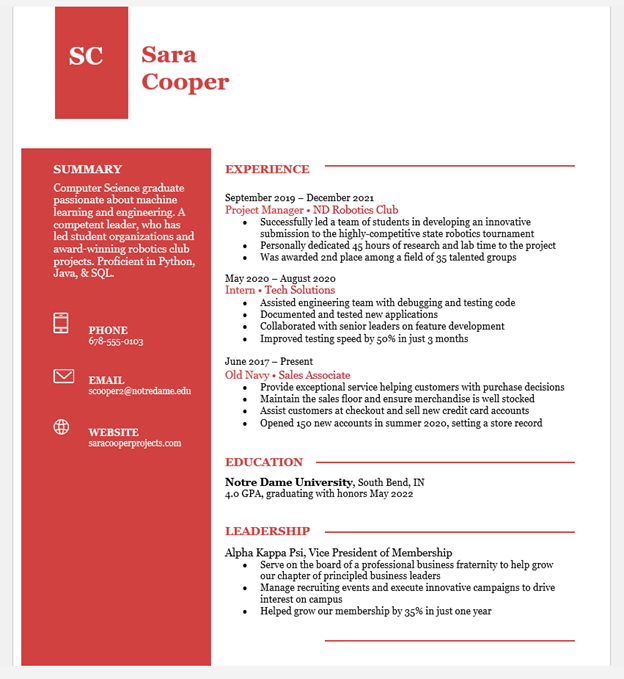If you’re a recent or soon-to-be college grad, you’re probably thinking quite a bit about your next chapter in life. It’s an exciting time with a world of possibilities, and you no doubt want every advantage as you venture out into the job market.
There are a number of different avenues for finding new opportunities, like online job sites (e.g., Indeed, ZipRecruiter), career fairs at your school, LinkedIn, or personal referrals from your network. But no matter how you hear about or apply for a job, you’ll need a professional résumé during the recruitment and/or interview process in most cases.
What is a résumé (and why do I need one)?
The French word résumé means “to summarize,” and while its origins are debated, the résumé dates back nearly 500 years! Leonardo Da Vinci has been credited as an early résumé writer, when he sent a letter to the Duke of Milan highlighting his qualifications as an inventor of war technologies.
Our use of the résumé today is pretty much the same as it was in Da Vinci’s day; it summarizes and highlights our relevant skills, education, and experiences. It’s meant to communicate our abilities and qualifications to a potential employer.
Think of your résumé as a marketing tool for your personal brand. It should clearly communicate what value you can bring to an organization, and sell them on your unique skills and potential.
Writing your résumé
For an early career résumé, you want to keep the content to one page. (Later in your career as you gain more experience, it might require two pages.)
A great résumé is concise, easy-to-read, and skimmable. A recruiter or hiring manager may spend only 60 seconds (or less) reviewing each résumé they receive, so it’s important they’re able to see your qualifications right away.
Have different versions of your résumé for different opportunities
A common mistake people make is having one version of their résumé that they send to every potential employer. A great way to stand out from the crowd of applicants is by submitting a résumé that is tailor-made for the job you’re applying to.
You can use the job description as your guide, and highlight your relevant skills and experiences that align. So for example, if the job description says they’re looking for someone who is “detail-oriented” and you’re someone who pays great attention to detail, make sure you have that competency listed on your résumé.
Craft a summary that sells your potential
The summary at the top of your résumé is a key place to highlight your skills and show why you’re qualified for the specific job you’re applying to.
A good summary:
- Highlights your relevant skills
- Mentions the industry and type of position you’re seeking (which should match the job you’re applying to)
- Specifies what you bring to the table for that role
Let’s look at Sara’s summary example:
“Computer Science graduate passionate about machine learning and engineering. A competent leader, who has led student organizations and award-winning robotics club programs.”
You see that in this summary, Sara is able to communicate how her school experiences and education make her a qualified candidate for a junior engineering position.
Your résumé should be 100% typo-free
Probably the most important thing to do before sending a résumé to a potential employer is proofread, proofread, proofread! And get an extra set of eyes (or more) on your résumé to catch any mistakes you might have missed.
Mistakes on a résumé are a big red flag for employers, and many recruiters will immediately throw out a résumé if they see a typo, misspelling, or poor grammar. You only get one page to show them your stuff, so make sure it’s flawless.
Use powerful words and show results
Words have tremendous power if wielded correctly. Beef up your résumé with powerful action verbs and follow them up with strong results. Companies want to hire people who can not only do the job but who can improve their performance and productivity.
When showing their experience on a résumé, people often share what they did, but forget to add what the outcome was. Use powerful action verbs as the foundation of your bullets to demonstrate your impact. Then tie those experiences to numbers or percentages to emphasize results whenever possible.
Here’s the formula: Action + Result
Action: What did you do?
Result: What was the outcome?
Let’s look at this experience example from Sara, with the power words and outcomes highlighted:
ND Robotics Club, Project Manager
– Successfully led a team of students in developing an award-winning submission to the highly-competitive state robotics tournament
– Personally dedicated 45 hours of research and lab time to the project
– Developed a creative and compelling presentation for the judges
– Was awarded 2nd place among a field of 35 talented groups
Highlight the skills an employer is looking for
Even with limited or no work experience, you can still tout both your technical skills and soft skills. If you have proficiency in any software programs or foreign languages, be sure to list those.
You can see in Sara’s example, she’s looking for a software engineering position, so she has listed her internship experience and highlighted the programming languages she knows in her summary.
Note: Never lie or exaggerate about your skills on your résumé. You could end up severely damaging your reputation, or at the very least, end up in a job that isn’t right for you.
For an entry-level position, employers aren’t expecting you to come in 100% proficient in every skill. A good job will give you the opportunity to learn and improve.
Here are a few additional tips for promoting your skills, from career sidekick:
- List your “hard” skills. If you’re proficient in any relevant tools, technologies, etc., you can include those in your résumé summary. But don’t list 20 things; that’s what your “skills” section is for. Pick the three or four top skills that are most relevant for the job you’re applying for to highlight.
- List your “soft” skills too. Are you great at analytical thinking? Do you love working as a part of a team? Are you great at multi-tasking and handling a fast-paced team environment? These are worth mentioning throughout your résumé, especially if you see them mentioned in the job description.
- Add statements that will grab the employer’s interest and make them want to ask you questions! Think about the things that make you interesting and unique and what you want the chance to talk about during the interview process.
What matters most when crafting your résumé is that you are confident in your abilities and what you bring to the table. Never feel you need to apologize for your lack of experience. Everyone has to start somewhere, and the more you show you’re up to the challenge and ready to learn, the more likely you are to get the gig.
Check out the career resources on MyAKPsi
Did you know you have access to tons of helpful career and professional development resources in the MyAKPsi Community? Log in for more helpful tips and resources to help you thrive in the working world.


